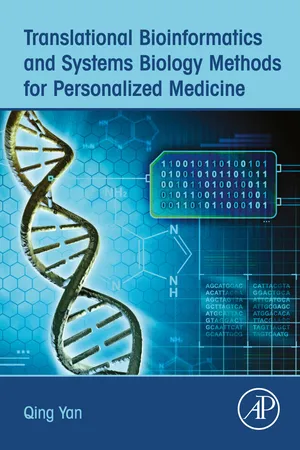
Translational Bioinformatics and Systems Biology Methods for Personalized Medicine
- 182 pages
- English
- ePUB (mobile friendly)
- Available on iOS & Android
Translational Bioinformatics and Systems Biology Methods for Personalized Medicine
About this book
Translational Bioinformatics and Systems Biology Methods for Personalized Medicine introduces integrative approaches in translational bioinformatics and systems biology to support the practice of personalized, precision, predictive, preventive, and participatory medicine. Through the description of important cutting-edge technologies in bioinformatics and systems biology, readers may gain an essential understanding of state-of-the-art methodologies.The book discusses topics such as the challenges and tasks in translational bioinformatics; pharmacogenomics, systems biology, and personalized medicine; and the applicability of translational bioinformatics for biomarker discovery, epigenomics, and molecular dynamics. It also discusses data integration and mining, immunoinformatics, and neuroinformatics. With broad coverage of both basic scientific and clinical applications, this book is suitable for a wide range of readers who may not be scientists but who are also interested in the practice of personalized medicine.- Introduces integrative approaches in translational bioinformatics and systems biology to support the practice of personalized, precision, predictive, preventive, and participatory medicine- Presents a problem-solving oriented methodology to deal with practical problems in various applications- Covers both basic scientific and clinical applications in order to enhance the collaboration between researchers and clinicians- Brings integrative and multidisciplinary approaches to bridge the gaps among various knowledge domains in the field
Frequently asked questions
- Essential is ideal for learners and professionals who enjoy exploring a wide range of subjects. Access the Essential Library with 800,000+ trusted titles and best-sellers across business, personal growth, and the humanities. Includes unlimited reading time and Standard Read Aloud voice.
- Complete: Perfect for advanced learners and researchers needing full, unrestricted access. Unlock 1.4M+ books across hundreds of subjects, including academic and specialized titles. The Complete Plan also includes advanced features like Premium Read Aloud and Research Assistant.
Please note we cannot support devices running on iOS 13 and Android 7 or earlier. Learn more about using the app.
Information
Introduction
Translational Bioinformatics and Personalized Medicine
Abstract
Keywords
1.1. Current Challenges in Biomedicine
1.2. Translational Bioinformatics as the “Vehicle” Toward Personalized Medicine
1.2.1. The Demand
Table of contents
- Cover image
- Title page
- Table of Contents
- Copyright
- Preface
- Part I. Concepts and Basic Tools
- Part II. Applications in Basic Sciences
- Part III. Applications in Clinical and Translational Sciences
- Index